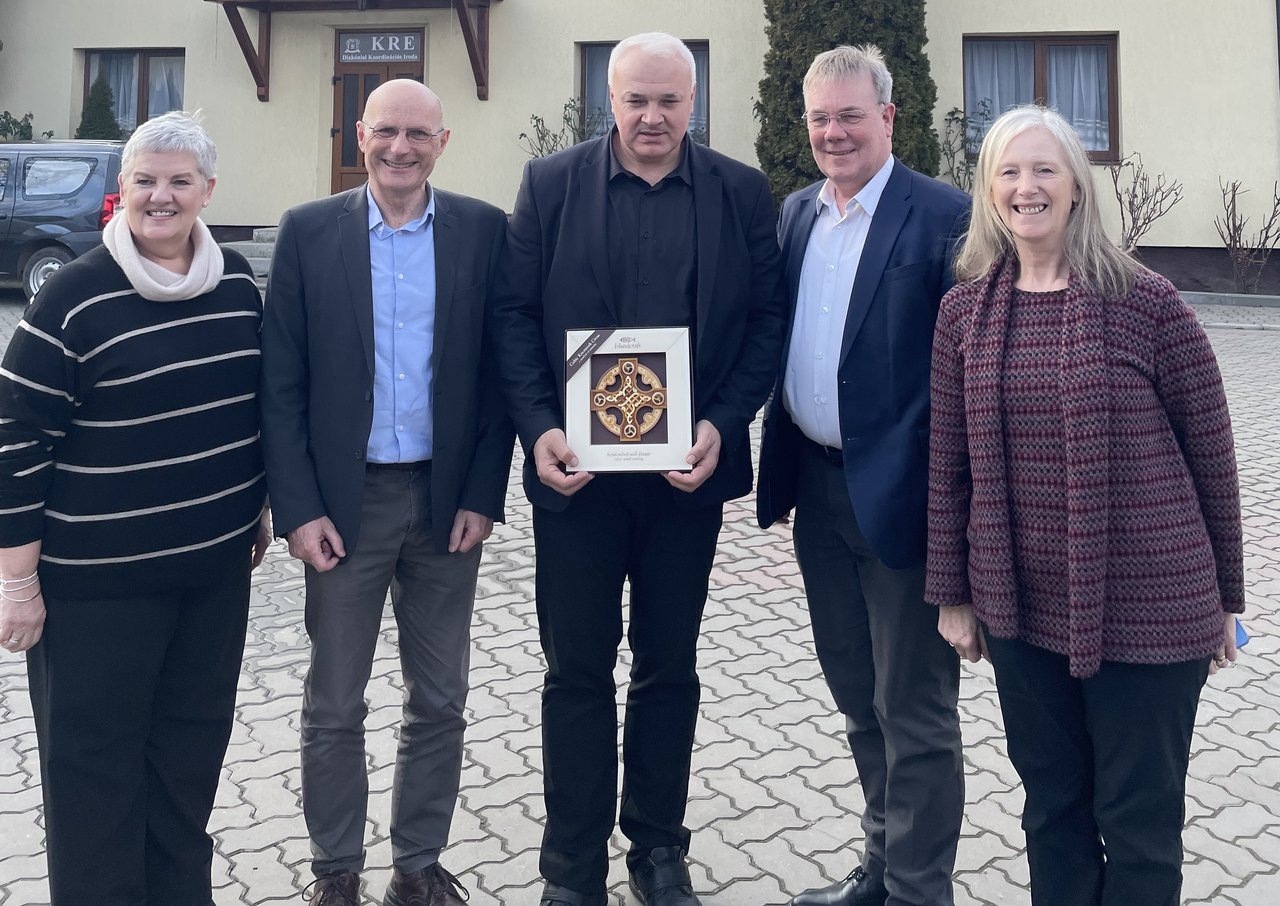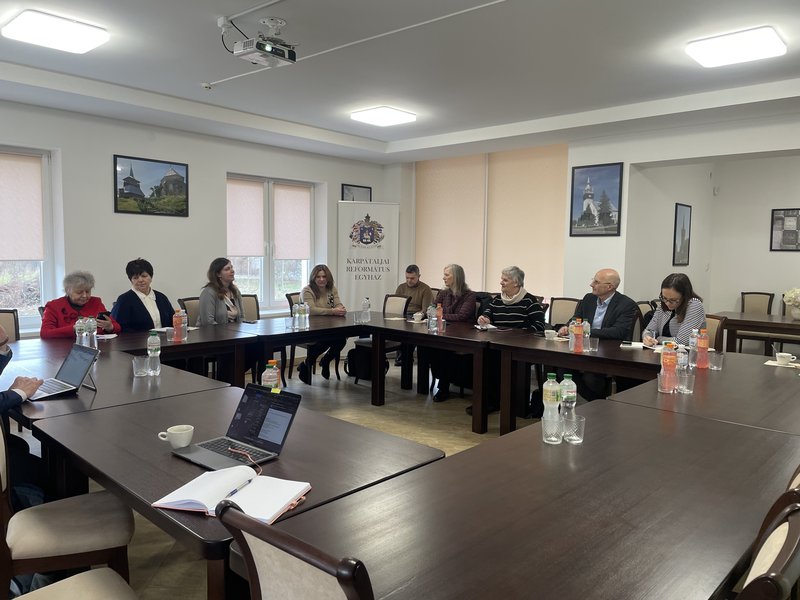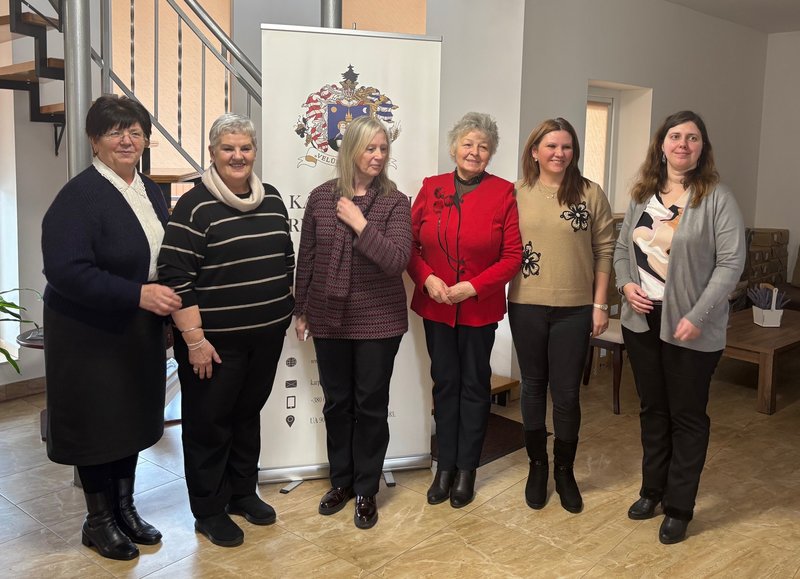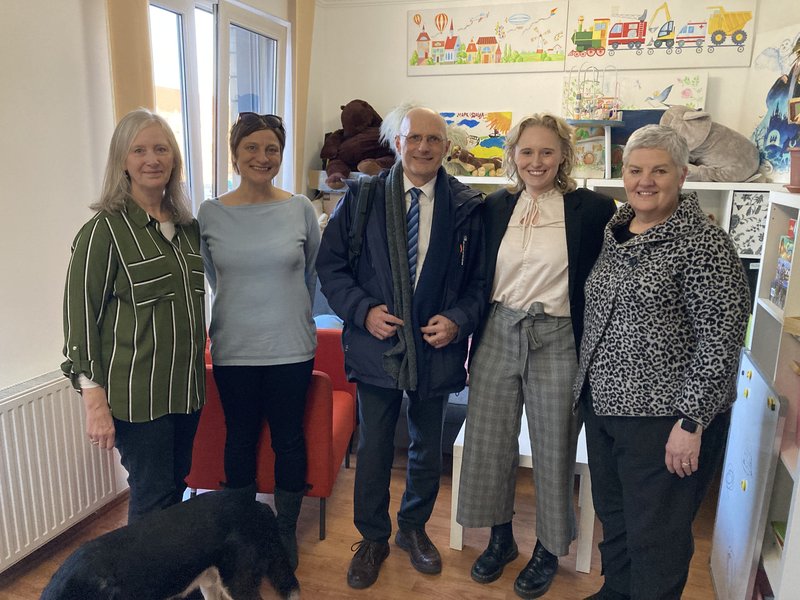Representatives of the Presbyterian Church in Ireland (PCI) and the Presbyterian Women (PW, PCI’s Women’s Association), together with the Moderator of the Church of Lippe in Germany visited the Reformed Church in Transcarpathia (RCT) and the Reformed Church in Hungary (RCH) between February 3rd and 5th. The visit underscored several vital areas of church life and mission work shared between the churches across their contexts and reaffirmed the long-standing partnership between the communities.

Member of the delegations in Beregszász with Bishop Sándor Zán Fábián
The Presbyterian Church in Ireland, a long-time partner of the Reformed Church in Hungary and the Reformed Church in Transcarpathia, sent three representatives to visit the RCH and RCT to discuss areas of shared mission and pastoral care. The representatives from PCI included Rev. Uel Marrs, PCI Overseas Secretary, Ellen Hillen, President of PW (PCI’s Women’s Association), and Linda Beattie, Overseas Vice-President of PW. Longtime partner and friend, Rev. Dietmar Arends, president of the Church in Lippe, Germany, was part of the solidarity visit.
In Transcarpathia, the representatives met with Béla Nagy, director of the Diaconal Coordination Office (DCO) of the RCT. They received a presentation of several activities the DCO implemented both before the Russian Federation’s invasion in 2022 and how these activities have altered or become overburdened due to the conflict. The Almond Tree Elderly and Alzheimer’s Rehabilitation Center and the 'Crisis Home' shaltering single women are examples of a long-standing DCO projects that have experienced difficulties following the escalation of the conflict. Nagy, along with the head nurse of the facility, explained to the representatives the challenges in finding personnel with so much emigration in the region. Transcarpathia, historically more economically disadvantaged than other regions in Ukraine, experienced emigration before the escalation of the war in 2022. Still, as Nagy and Bishop Zán-Fábián of the RCT explained to the representatives, the conflict has drastically increased the number of individuals leaving the region, particularly young people. Many get left behind, mainly those particularly vulnerable populations such as ill, disabled, or elderly individuals. These individuals, as Nagy explained, need both physical and spiritual care.
The DCO and the RCT work to reach the vulnerable to the best of their abilities through its Almond Tree Rehabilitation Center, its Home Care Network, delivering care to those who cannot travel, a social kitchen network providing meals to those in need, and various pastoral care activities. As Bishop Zán-Fábián explained, it is vital in these uncertain times that the church maintains its critical role as a cornerstone of the community, uplifting congregants and encouraging their continued faith in God.

In addition to visiting the DCO projects, the PCI and PW representatives met with representatives of the RCT Women’s Association: Ibolya Zán-Schramm, president and Ida Ádám, vice president in the presbytery of Máramaros-Ugocsa, Krisztina Jakab, president and Noémi Barta-Nyiri, vice president of the branch in the church presbytery of Bereg. The Women’s Association in Transcarpathia has always been active in organising events in congregations across the region, prayer campaigns, and various activities. However, following the escalation of the war in 2022, the consequential migration out of the country resulted in a higher proportion of women in churches than men. The Women’s Association in Transcarpathia is a source of comfort and spiritual renewal for many mothers and elderly women experiencing family separation due to the war, providing a space for women to gather and celebrate their community and faith together. Throughout this meeting, the RCT Women’s Association and the PW representatives highlighted several points where there are similarities between the two groups despite contextual differences. For instance, the PW regularly distributes prayers and reflections for its members, similar to the RCT Women’s Association. The PW representatives commended the strength of the RCT Women’s Association and the perseverance of their faith despite the uncertainties and challenges their communities face.

The representatives also visited one of the four reformed secondary schools, the Lycee in Nagydobrony (Velyka Dobron). Here, the school's headmaster gave an overview of how the education system works and how important it is to have reformed Hungarian institutions that allow ethnic Hungarians the opportunity to study Ukrainian as a foreign language, allowing smoother instruction and learning. The headmaster also discussed the difficulties educators face and the decline in school enrolment due to migration from the region.
In Budapest, the representatives met with Bishop József Steinbach, Ministerial President of the Reformed Church in Hungary. Bishop Steinbach expressed his gratitude for the relationship between the two churches and the solidarity the PCI has shown the reformed communities in Transcarpathia throughout the recent times of challenges. The Bishop recalled that PCI has been one of the prominent supporters of the humanitarian intervention of the Hungarian Reformed Church Aid in Ukraine and the solidarity fund the RCH set up to support pastors’ families in Transcarpathia. Bishop Steinbach also expressed his appreciation for the solidarity and trust PCI continued to show to the RCH during the political crisis in the wake of the clemency case and assured the delegation of his ongoing commitment to intensified exchange and cooperation in mission, church renewal, youth ministry and social ministries.
Next, the PCI representatives met with the mission service of the RCH, where Rev. Zoltán Levente Hajdú, head of the mission service, presented the different elements and activities of the service. The presentation particularly highlighted those activities of the service, which focus on congregation and church building, pastoral care, and reformed identity research. The mission service has made substantial efforts to provide churches with tools and materials to adapt and revitalise their activities and elements of their service to adapt to their congregations. Additionally, the mission service is conducting a research project to explore reformed identity in the 21st century, including insight from missiologists, sociologists, leaders of the RCH, and polls from church members. The PCI representatives expressed that in their church communities, they, too, are exploring new ways to involve churches in exploring reformed identity and its transformation over time. For the PCI, a lot of focus in their work goes into intergenerational connections within congregations, focusing on the community as a family and encouraging intergenerational learning among a congregation.

The PCI representatives also visited the Hungarian Reformed Church Aid (HRCA) Refugee Ministry. Here, they met with the head of the service, Ms. Kata Vereb, who presented on the previous activities and projects and the future perspectives of the service. In addition to supporting projects in Transcarpathia, the Presbyterian Church in Ireland was one of many international partners who extended financial support to the HRCA Refugee Ministry following the Russian Federation’s invasion to assist with the emergent needs of those displaced by the conflict. Following the introduction of the service’s activities, the representatives had the opportunity to meet with members of a women’s club that regularly occurs at the Refugee Ministry. The women’s club comprises Ukrainian women who gather to work on activities, celebrate holidays, discuss cultural or historical topics, or even dance and sing together. Here, the representatives spoke to some women about their experience moving to Budapest and gained insight into the challenges they face integrating into their new environment.